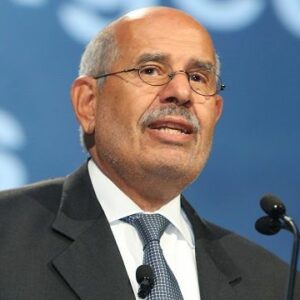Dr. Mohamed Mustafa ElBaradei is an Egyptian lawyer and diplomat who served as Director General of the International Atomic Energy Agency (IAEA) and was awarded the Nobel Peace Prize in 2005 for his efforts. He advocated democratic rights for Egyptians and freedom of speech for the press and everyone else, just like his father. During his time as Director General of the International Atomic Energy Agency, he advocated for nuclear disarmament and the use of nuclear energy for peaceful purposes. He was a strong supporter of diplomatic efforts to address nuclear proliferation issues in countries such as North Korea and Iran, and he noted that the IAEA had found no weapons of mass destruction in Iraq, which was the main reason for America’s and its allies’ invasion of Iraq. He served as the head of the IAEA for three terms in a row, and he continued his campaign for nuclear disarmament while he was there and even after he left. He was fluent in Arabic, English, and French, as well as a passable German, which aided him in his employment in Vienna. When he returned to Egypt following his time as IAEA Director, he considered President Hosni Mubarak’s dictatorship intolerable and campaigned vehemently for its overthrow, serving as Egypt’s interim Vice President from 14 July to 14 August 2013.
Childhood and Adolescence
Mohamed ElBaradei was born on June 17, 1942, in Cairo, Egypt. Mostafa ElBaradei, his father, was an Egyptian lawyer and the head of the Egyptian Bar Association.
He graduated from the University of Cairo with a bachelor’s degree in law in 1962. He earned his ‘Master of International Law’ at Geneva’s ‘Graduate Institute of Studies.’
In 1974, he earned a ‘Doctor of Juridical Science’ from New York University.
Career of Mohamed ElBaradei
Mohamed ElBaradei began his diplomatic career in 1964 with Egypt’s Ministry of External Affairs, serving in the Permanent Missions of Egypt to the United Nations in New York and Geneva. He was given the task of dealing with legal, political, and arms control challenges.
He was the Egyptian foreign minister’s special assistant from 1974 to 1978.
He was promoted to senior fellow in charge of the United Nations Institute for Training and Research’s ‘International Law Program.’
From 1981 until 1987, he served as an adjunct professor at the ‘New York School of Law,’ where he taught international law.
From 1984 through 1993, he worked as a senior staff member and the IAEA Secretariat’s legal adviser.
Between 1993 and 1997, he served as the ‘Assistant Director General for External Relations.’
He is currently a member of the ‘American Society of International Law’ as well as the ‘International Law Association.’
On December 1, 1997, he was appointed Director General of the International Atomic Energy Agency and sent to Vienna. He urged all countries to follow the ‘Model Additional Protocol’ for declaring undeclared nuclear weapons, which had been adopted by more than 93 countries by 2009.
In 2001, he was re-elected to the position. In March 2003, he told the UN Security Council that the search in Iraq in 2002 turned up nothing incriminating.
The United States opposed his re-election for a third term, while Russia, China, France, Germany, and many developing countries backed him. On June 13, 2005, he was unanimously elected to the position after the United States abandoned its objections. In 2008, when he was offered a fourth term, he declined.
He stated his desire to lead a provisional administration on January 25, 2011, the day the instability in Egypt began.
He returned to Egypt on January 27, 2011, but the Muslim Brotherhood, the biggest opposition party, was hesitant to make him the movement’s leader.
In March 2011, he launched his candidacy for President, but later withdrew it.
ElBaradei founded the Constitution Party on April 28, 2012, which combined with other secular parties to form the ‘National Salvation Front’ against President Mohammed Morsi’s dictatorship on November 24, 2012. On December 5, 2012, he was appointed as its coordinator.
After President Mohamed Morsi was deposed, ElBaradei was named Prime Minister on July 4, 2013, but the declaration was later reversed on July 7, 2013 because to opposition from several parties.
On July 14, 2013, he was elected Vice President, but resigned on August 14, 2013, after security forces murdered 525 supporters of ousted President Mohamed Morsi during protests.
Achievements & Awards
On October 7, 2005, ElBaradei and the International Atomic Energy Agency shared the Nobel Peace Prize for their work on nuclear disarmament and the peaceful use of nuclear energy.
Many governments have honored him, including the highest accolade bestowed by his own country.
Personal History and Legacy
Aida El-Kachef, who works as a teacher, is Mohamed ElBaradei’s wife.
They have two children: Laila, a daughter, and Mostafa, a son. His daughter works as a lawyer in London, while his son works as an IT manager in Cairo. Maya and Nina are his two granddaughters.
The Egyptian Post honored him with a Nobel Laureates stamp issued on October 8, 2005.
Work in the Humanitarian Sector
He attempted to persuade countries to abandon their nuclear weapons development in order to spare the world from a nuclear catastrophe in the future.
Estimated Net Worth
Mohamed is one of the wealthiest world leaders and one of the most beloved. Mohamed ElBaradei’s net worth is estimated to be $1.5 million, according to Wikipedia, Forbes, and Business Insider.


